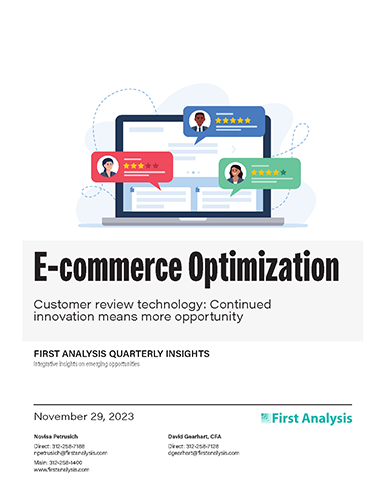Quarterly insights: E-commerce optimization
Customer review technology: Continued innovation means more opportunity

Today, basic consumer-facing review technology is considered a commoditized, mature area. However, there are areas of innovation where providers offer differentiated solutions. These areas represent compelling growth opportunities for emerging providers and their investors.
Several factors are driving this innovation, including advances in machine learning and natural language processing technology, increasing e-commerce regulation, and growth in e-commerce’s share of total retail sales.
We map the market and explore five review technology subsegments in detail: core review data management platforms, vertical review platforms, social listening platforms, review data analytics platforms, and customer intelligence platforms. We also highlight some key players in and adjacent to each area.
TABLE OF CONTENTS
Includes discussion of TRIP and seven private companies
- Evolution of customer review technology
- Where review technology is headed
- Challenges facing the review technology market
- Five trends to keep in mind
- Core review data management platforms
- Vertical review platforms
- Social listening platforms
- Review data analytics platforms
- Customer intelligence platforms
- Review technology: An overlooked area primed for the spotlight
- First Analysis E-commerce Optimization Index near one-year high
- E-commerce M&A: Notable transactions include Affable.ai and PowerReviews
- E-commerce private placements: Notable transactions include Faire Wholesale and Pitchy.io
Evolution of customer review technology
Clinical trials are the backbone of medical research, serving as a key bridge between drug development and patient care. As we have discussed in our previous reports, clinical trials are expensive and time consuming, and any delay pushes out the timeline for potential approval, meaning lost opportunities to improve patients’ lives and unrecoverable revenue. Supplying clinical trials with trial therapies, or investigational medicinal products (IMPs), is a pivotal part of the clinical trial process that can affect trials’ success, cost and speed. The critical nature of clinical trial supply management became especially apparent during the pandemic, which highlighted supply chain weaknesses in areas such as third-party logistics, forecasting, inventory visibility and staffing. With this in mind, pharmaceutical companies are increasingly turning to technology-based solution providers to handle some or all of their clinical trial supply needs.
Before the internet, review data (and often even basic product and service data) was not easily accessible. For product and service insights, people mainly sought views from trusted personal acquaintances. That changed with advent of the internet, which ultimately made millions of reviews on hundreds of websites and marketplaces available to consumers in a matter of seconds.
But this didn’t happen overnight.
In the late 1990s, review functionality was nascent and primarily associated with marketplaces. Some companies focused on review aggregation, and a few prominent players like Rateitall.com, Deja.com and Epinions began to dominate the space. This developing landscape witnessed a wave of mergers and acquisitions, most notably Google’s acquisition of Deja.com, which offered online comparison-shopping services, search capabilities, online ratings, and internet discussion forums. Today, Google is considered a review powerhouse where businesses need to rate highly if they expect to gain consumer trust and drive business from search engine optimization and the Google platform.

Request full report
To access the full report, please provide your contact information in the form below. Thank you for your interest in First Analysis research.
